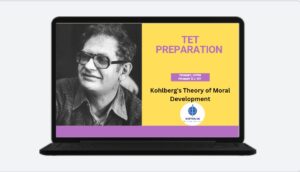Kohlberg’s Moral Development Theory In English
Kohlberg’s Moral Development Theory
The full meaning of the word TET is: Teacher’s Eligibility Test. According to the instructions of NCTE, currently, passing TET is one of the main conditions for employment in teaching from primary to higher secondary level. Keeping this in mind, we are highlighting our efforts to help competing students in the TET Niryas section, where Study Materials on the content of West Bengal Primary and Upper Primary TET, CTET Paper-I and Paper-II and SLST are available. Incidentally, the post called Kohlberg’s Moral Development Theory discusses various information about Kohlberg and his Theory :

Kohlberg’s Moral Development Theory
➲ Lawrence Kohlberg : Born : October 25, 1927, in Bronxville, New York. He studied psychology at the University of Chicago, where he earned his Ph.D. in 1958. Death : He died in 1987 at the age of 59.
➲ Early Life and Education : Lawrence Kohlberg was born on October 25, 1927, in Bronxville, New York. He studied psychology at the University of Chicago, where he earned his Ph.D. in 1958. Kohlberg taught at several universities, including Harvard University, the University of Chicago, and Yale University. where he was a professor of education and social psychology.His research focused on moral development, education, and social psychology.
➲ Theory :Kohlberg’s Moral Development Theory proposes that individuals progress through a series of stages, each characterized by a unique moral perspective. The theory is based on the idea that moral development is a result of cognitive development, and that individuals progress through stages as they develop their moral reasoning abilities.
Lawrence Kohlberg’s “Theory of Moral Development” is a comprehensive framework that explains how individuals progress through stages of moral reasoning and development. Here are the key details about Kohlberg’s Theory:
➲ Stages of Moral Development : Kohlberg identified six stages of moral development, which are divided into three levels:
1. ➲ Level 1: Pre-Conventional Stage : At this stage, individuals base their moral decisions on external rewards and punishments. They have not yet developed a sense of moral principles.
✦ Stage-I: Obedience and Punishment Orientation: Individuals at this stage obey rules and norms to avoid punishment.
✦ Stage-II: Individualism and Exchange : Individuals at this stage pursue their own interests and exchange favors with others.
2. ➲ Level 2: Conventional Stage : At this stage, individuals base their moral decisions on social norms and expectations. They have developed a sense of moral principles, but they are still influenced by external factors.
✦ Stage III: Good Interpersonal Relationships : Individuals at this stage prioritize maintaining good relationships and seek approval from others.
✦ Stage IV: Maintaining the Social Order : Individuals at this stage prioritize maintaining social order and respect for authority.
3. ➲ Level 3: Post-Conventional Stage : At this stage, individuals base their moral decisions on internalized moral principles. They have developed a sense of moral autonomy and are guided by their own moral values.
✦ Stage V: Social Contract and Individual Rights : Individuals at this stage prioritize social justice and individual rights.
✦ Stage VI: Universal Principles : Individuals at this stage prioritize universal principles and moral absolutes.
➲ Key Concepts :
✦ Moral Reasoning : Kohlberg believed that moral development is a result of cognitive development, and that individuals progress through stages as they develop their moral reasoning abilities. He emphasized the importance of moral reasoning in making ethical decisions.
✦ Moral Principles : Kohlberg believed that moral principles are universal and absolute, and that they are based on the principles of justice, equality, and respect for human rights.
✦ Moral Autonomy : Kohlberg believed that moral autonomy is the highest stage of moral development, where individuals are guided by their own internalized moral principles.
✦ Justice : Kohlberg believed that justice is a fundamental moral principle that guides human behavior.
✦ Social Contract : Kohlberg argued that social contract theory provides a framework for understanding moral development.
➲ Implications for Education : Kohlberg’s Moral Development Theory has significant implications for education :
1. Moral Education: Kohlberg’s theory emphasizes the importance of moral education in promoting moral development.
2. Ethical Decision-Making: Kohlberg’s theory provides a framework for ethical decision-making in business and personal life.
3. Leadership Development: Kohlberg’s theory can be applied to leadership development, emphasizing the importance of moral reasoning and ethical decision-making.
➲ Applications :
✦ Education : Kohlberg’s Moral Development Theory has been applied in educational settings to promote moral development and character education.
✦ Clinical Psychology : Kohlberg’s theory has been used in clinical psychology to understand moral development and to develop interventions to promote moral development.
✦ Business Ethics : Kohlberg’s theory has been applied in business ethics to promote moral development and to develop ethical decision-making frameworks.
➲ Influence and Legacy : Kohlberg’s work has had a significant impact on the fields of psychology, education, and philosophy. His theory of moral development has been widely applied in educational settings and has influenced the development of moral education programs.
➲ Future Research Directions :
✦ Cross-Cultural Research : Future research should focus on testing Kohlberg’s theory in different cultural contexts to determine its universality.
✦ Longitudinal Studies : Future research should focus on conducting longitudinal studies to examine the stability and change of moral development over time.
✦ Interventions : Future research should focus on developing and testing interventions to promote moral development and character education.
➲ Criticisms and Limitations : Kohlberg’s Moral Development Theory has been subject to various criticisms and controversies, including charges of cultural bias, gender bias, and oversimplification.
✦ Cultural Bias : Kohlberg’s theory has been criticized for being culturally biased, as it is based on Western moral values and principles.
✦ Lack of Empirical Support : Kohlberg’s theory has been criticized for lacking empirical support, as it is based on a limited number of studies and case analyses.
✦ Too Broad : Kohlberg’s theory has been criticized for being too broad, as it attempts to explain all aspects of moral development rather than focusing on specific areas.
✦ Gender Bias: Kohlberg’s theory has also been criticized for being gender-biased, as it prioritizes justice over care and compassion.
✦ Oversimplification: Kohlberg’s theory has been criticized for oversimplifying the complexity of human moral development.
➲ Important Researchers :
✦ Lawrence Kohlberg : Kohlberg is the founder of the theory of moral development.
✦ Carol Gilligan : Gilligan is a psychologist who has critiqued Kohlberg’s theory for being culturally biased and lacking empirical support.
✦ James Rest : Rest is a psychologist who has developed a theory of moral development that is based on Kohlberg’s theory but also incorporates other moral development theories.
➲ Publications and Awards : Kohlberg published numerous articles and books, including “The Philosophy of Moral Development” (1981) and “The Psychology of Moral Development” (1984). He received several awards for his contributions to psychology and education, including the American Psychological Association’s Distinguished Scientific Contribution to Psychology Award.
প্রাথমিক টেট প্রস্তুতির জন্য ক্লিক করুনঃ
উচ্চ প্রাথমিক টেট প্রস্তুতির জন্য ক্লিক করুনঃ
➲ Important Books Research Papers :
➱ Important Books of Kohlberg:
✦ “The Philosophy of Moral Development” (1981)
✦ “Essays on Moral Development” (1981)
✦ “The Psychology of Moral Development” (1984)
✦ “Moral Stages: A Current Formulation and a Response to Critics” (1973)
✦ “The Meaning and Measurement of Moral Development” (1971)
➱ Research Papers:
✦ “A Cognitive-Developmental Approach to Socialization” (1969)
✦ “Moral Development and Moral Education” (1975)
✦ “Revisions in the Theory and Its Application” (1981)
✦ “The Meaning and Measurement of Moral Development” (1981)
✦ “The Relationship Between Moral Judgment and Moral Action” (1984)
These books and papers provide a comprehensive overview of Kohlberg’s theory of moral development and his research on moral education and moral judgment.
➲ Conclusion : Kohlberg’s theory of moral development provides a comprehensive framework for understanding moral development and promoting moral education. While the theory has been influential, it has also been subject to criticisms and limitations. Future research should focus on addressing these limitations and developing new interventions to promote moral development. Kohlberg was known for his passion for social justice and his commitment to applying psychological principles to real-world problems. He died in 1987 at the age of 59. ➤ বাংলায় পড়ুন
⟽ Previous Post : Vygotskys Cultural-historicalTheory Cognitive Development


